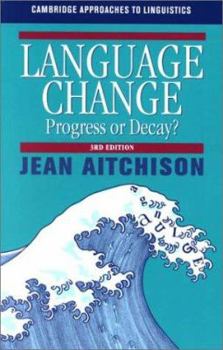Language Change: Progress or Decay?
(Part of the Cambridge Approaches to Linguistics Series)
Select Format
Select Condition 
Book Overview
This book gives a lucid and up-to-date overview of language change, discussing where our evidence about language change comes from, how and why changes happen, and how languages begin and end. It... This description may be from another edition of this product.
Format:Paperback
Language:English
ISBN:0521795354
ISBN13:9780521795357
Release Date:December 2000
Publisher:Cambridge University Press
Length:324 Pages
Weight:1.15 lbs.
Dimensions:0.6" x 5.0" x 7.7"
Customer Reviews
1 rating
Written at a fairly simple level, but the information is useful even to experienced students
Published by Thriftbooks.com User , 18 years ago
While it's title might make the book seem a collection of papers taking sides in a debate, LANGUAGE CHANGE: Progress or Decay is a textbook written by Jean Aitchison introducing contemporary study of language change to beginning students of linguistics. The book has proven quite popular for its gentle tone and its clear summarization of important work in the field, and is now in its third edition. This reviewer is a graduate student of historical linguistics, and I've several years of experience in the field. For all its simplicity, however, Aitchison's book was relevatory. Those with training in the Indo-European or Uralic language families tend to think of language change as some abstract sequence of events that are cleanly reconstructed with the comparitive method. Our traditional handbooks are rather divorced from contemporary research and don't consider the "why" and "how" of language change. Aitchison remedies this by considering language as a product of human beings, with all of their social pressures and insecurities. She first presents the work of William Labov, who viewed language change in progress in 20th-century new York. His work tells us about how varying standards of pronunciation in a given population spread or die depending on social prestige. Another matter this student of historical linguistics was unclear about is exactly why sounds tend to change along the same lines in all language families. Everyone knows that final consonants tend to be lost, labiovelars stops may become /p/ or /b/, and /l/ often shifts to /w/. Aitchison explains the physical causes for these common phonetic and ultimately phonological changes. By far the most rigorous and useful chapter for me was "The Mad-Hatter's Tea Party", an admirably easy-to-grasp explanation of push chains and drag chains with plenty of examples. As for the question in the subtitle, Aitchison ceaselessly stresses that language change is natural and unavoidable. She quotes from a long line of English-language purists, from Jonathan Swift to William Safire to show the absurdity of seeking to freeze language at a given moment. At the same time, she emphasises that languages do not evolve towards some ideal, but rather endlessly wheel about from one configuration to another. I highly recommend this book to any student of historical linguistics. Even if you have some training in the field, you're bound to find something new and exciting in Aitchison's text.





